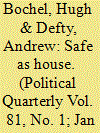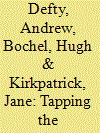|
|
|
Sort Order |
|
|
|
Items / Page
|
|
|
|
|
|
|
| Srl | Item |
| 1 |
ID:
163796


|
|
|
|
|
| Summary/Abstract |
The establishment of the Intelligence and Security Committee (ISC) in 1994 for the first time allowed British parliamentarians access to intelligence agency staff and records. However, as a committee of parliamentarians, but not a parliamentary committee, the ISC was a constitutional anomaly. In 2013, significant reforms reconstituted the ISC as a parliamentary committee, with enhanced powers and an expanded mandate. Drawing on interviews with ISC members and detailed examination of committee business, this article examines the impact of recent reforms. It argues that while reform has had a significant impact on the committee, in a number of respects it remains strongly constrained by government.
|
|
|
|
|
|
|
|
|
|
|
|
|
|
|
|
| 2 |
ID:
171239


|
|
|
|
|
| Summary/Abstract |
Some form of legislative oversight of intelligence has become the norm in most democratic states. The near universal acceptance of the need for democratic oversight does not, however, mark the end of a process of intelligence accountability. In many states following a period of establishment and then consolidation, intelligence oversight mechanisms have begun to evolve as oversight committees have sought extra powers and developed new roles. This article examines reforms in parliamentary intelligence oversight committees in Australia, Canada, New Zealand and the UK, focusing on the form, mandate, membership, powers and resources of the committees as well as their engagement with other parliamentary actors.
|
|
|
|
|
|
|
|
|
|
|
|
|
|
|
|
| 3 |
ID:
095292


|
|
|
|
|
| Publication |
2010.
|
| Summary/Abstract |
Social policy is of key importance to contemporary society, accounting for two thirds of public expenditure and, through provision such as the NHS, pensions, benefits, schools, universities and social care, touching on the lives of much of the population on a daily basis. It has also been one of the areas where the Conservative party have sought to change their image, and to some extent policies, under David Cameron. Drawing upon a range of evidence, including interviews with more than ten per cent of the House of Commons and the House of Lords, this article examines the potential challenges for a Conservative government of either stance, focusing on the extent of possible support for the Conservatives' approach to social policy amongst three key groups: the public, MPs, and members of the House of Lords.
|
|
|
|
|
|
|
|
|
|
|
|
|
|
|
|
| 4 |
ID:
133417


|
|
|
|
|
| Publication |
2014.
|
| Summary/Abstract |
In 1966, in what has become known as the Wilson Doctrine, the Prime Minister, Harold Wilson, informed Parliament that he had issued an instruction that the telephones of parliamentarians were not to be intercepted by the intelligence and security agencies. Subsequent Prime Ministers have all expressed their continued commitment to the Wilson Doctrine. This article examines the nature and limitations of the Wilson Doctrine, and its continued application in the context of recent legislative changes and a number of prominent recent cases. It focuses on apparent changes to the scope and attempts to set aside the Wilson Doctrine under the Blair government and the implications of the interception of the communications of Sinn Fein Members of Parliament, and the bugging of meetings involving the Labour MP Sadiq Khan.
|
|
|
|
|
|
|
|
|
|
|
|
|
|
|
|
|
|
|
|
|